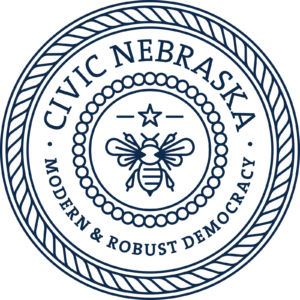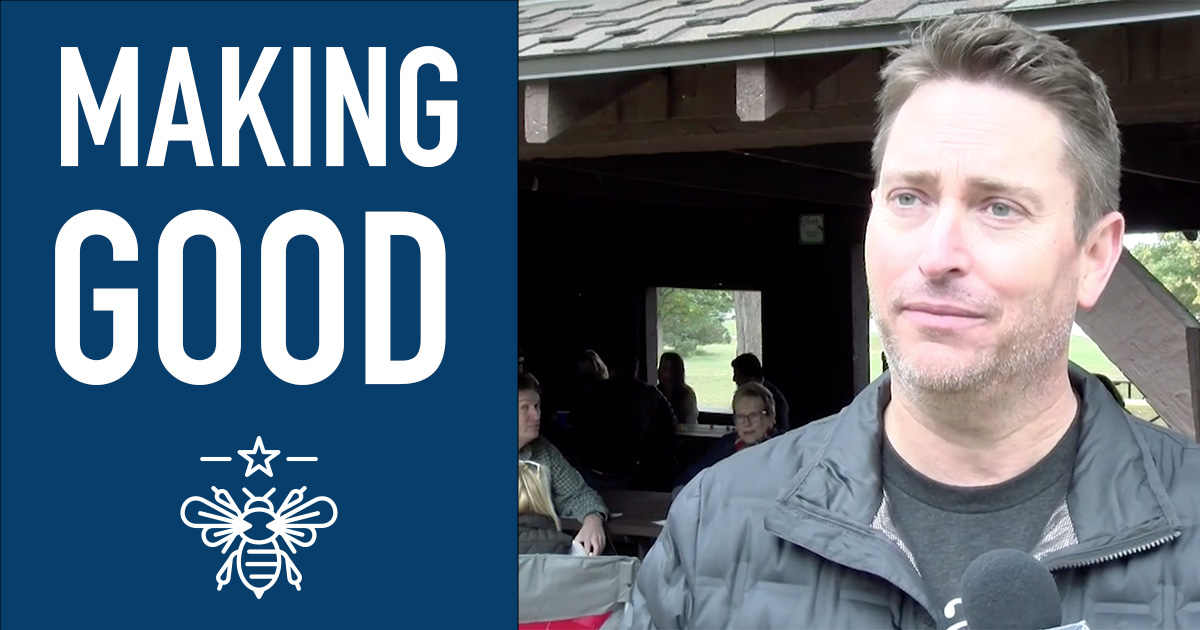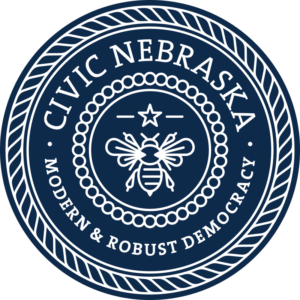On Oct. 23, Civic Nebraska’s Steve Smith, a 2020-21 Civic Saturday Fellow, delivered the following ‘civic sermon’ at Antelope Park at our latest Civic Saturday gathering. To hear audio of the full Civic Saturday, click here.
Thank you, again, for being here today. I love Lincoln’s public parks, don’t you? They’re community spaces where we can gather and connect. So I’m really glad you’re here with us this morning.
So some of you know that my father died in late August, after a long fight with cancer. I’d say that he had a good death. And by that, I mean that he died peacefully, prepared to die, with my mom and me by his side.
He had a long life – he was nearly 80, and that meant he stuck to a number of old-school beliefs: Toughness, and self-reliance, and red-blooded Americanism – and, true to certain men of his generation, showing as little emotion as possible.
Sometimes I had to wonder if he thought I was actually his kid. We were quite different people – worldviews, likes and dislikes, sensibilities. But Dad and I always had a really healthy relationship built on mutual trust. We just showed up for one another.
This summer, realizing his time was growing short, he summoned me. Get the DNR in order. Sell the house and the car. Take care of the life insurance. Settle the bills. And, if he had me alone, out of earshot of others, he’d say to me: Make sure that your mother will be alright. She’s lost most of her sight, and you kids are all she’ll have to count on when I’m gone. So above all, take care of your mother.
Of course, Dad. I’d say. I promise.
Well, let me tell you. To die in America today is quite the affair. It creates a lot of paperwork and legwork and legal work for your next of kin. Mind you, I’m not complaining; I’d been preparing for this ever since Dad’s cancer came back two years ago. But the thing is, I had expected to share the job with my older sister, who lived in Omaha. Then, barely 27 hours after my father died, so did my sister.
This was nothing like Dad’s death. My sister died suddenly and shockingly. One minute she was there, and the next, gone. So this threw everyone in my family for an emotional and cosmic loop.
Plans had changed. The landscape had changed. Radically.
Take care of your mother.
Of course, Dad. I promise.
This echoes loudly now, as I suddenly find myself the sole caretaker of my mom. Now, I enjoy this role a lot, of course. And Mom, I’m so happy you’re here today – I want you to know that you give me strength and inspiration every day.
Taking care of the little things for my mom doesn’t make me a hero. It makes me her son. I’m simply doing what I said I would, even though when I casually made that promise to Dad, I assumed things would go differently than they actually did.
Amid all this, I came across a phrase in my reading. It goes like this: How you do anything is how you do everything.
It means how we handle today will have a permanent effect on how we handle every day hereafter. How we handle this minute has an impact on how we’ll handle every minute going forward. So it’s a reminder to pay attention to what’s in front of us – the task at hand and to be mindful of it. And, just as importantly, to focus on the principle and purpose behind that task.
How you do anything is how you do everything.

In today’s America, we can wear ourselves out looking for positive examples of this. I mean, the very word “promise” feels kind of empty. We all break promises, all the time. You do, I do, we all do. It’s just human to say one thing and then do another. You certainly see it on Capitol Hill; politicians making, and then casually breaking, promise after promise.
You’ve heard me say, repeatedly, that we can do great things if we see ourselves not just as individuals, but as co-creators of our shared democratic reality. In that spirit, let’s reflect today on the consequences of making good on our promises – large and small. Because honoring our individual commitments means that together, in the long run, we make good on our collective promise. Our American promise.
That national creed. That shared civic religion that brings us here today. But that we too often struggle with.
Today is a good day to talk about American promise. Let’s get into that. Then, let’s talk about the difference between promise and practice. And finally, let’s talk about how we might close that gap.
The American promise.
Let’s go back to a notable year in world history – 1776. A certain document by Thomas Jefferson and friends had just made the rounds and, what do you know, it officially started a revolution. It put a charge into the patriots who were already fighting the British. But can you imagine what the reaction was outside America?
Yeah. It hit like a thunderbolt. Got the attention of the French and the Spanish – just like the rich guys who didn’t want to pay their taxes had hoped it would. So before long, they joined in. Eventually, at Yorktown, we kicked Cornwallis off the continent and told his royal majesty that we were never, ever getting back together.
It all started with that Declaration. That resolution. It changed everything.
But here’s what Jefferson and crew probably didn’t count on: The Declaration continues to change everything. In ways he and his co-authors could never have imagined.
 Do you know who knew it? Mercy Otis Warren. Remember Mercy? She was a poet in Revolutionary Boston. And she saw something big in the Declaration. She recognized that if it was gonna be worth the paper it was written on, then the democratic principles laid out in it would eventually have to include everybody: Women. Enslaved peoples. Anyone in early America who was treated like a second-class citizen. Mercy Otis Warren wrote, at the time, that the Revolution was “to remind mankind of its natural equality.” And here it was, down on paper!
Do you know who knew it? Mercy Otis Warren. Remember Mercy? She was a poet in Revolutionary Boston. And she saw something big in the Declaration. She recognized that if it was gonna be worth the paper it was written on, then the democratic principles laid out in it would eventually have to include everybody: Women. Enslaved peoples. Anyone in early America who was treated like a second-class citizen. Mercy Otis Warren wrote, at the time, that the Revolution was “to remind mankind of its natural equality.” And here it was, down on paper!
This wasn’t just some list of royal grievances. It was a radical proclamation that would defy time and space, and race and gender, and station and circumstance. It was an alarm bell, set to ring, perpetually, throughout the future history of a country that was just then coming to be.
Mercy Otis Warren was among the first, but not the last, to see a self-perpetuating promise that could not be limited to rich men who didn’t want to pay taxes.
And, by and large, history has proven her right. By and large.
That’s the American promise. The promise of equality – frozen in ink and paper – but ringing like an alarm, again and still, across the centuries. From equality all other things flow. Justice. Opportunity. Freedom. Without equality, those are all just empty words.
The American promise. Our lives, our fortunes, and our sacred honor.
But as we know, promises and practices are two very different things.
All men are created equal. That’s pretty straightforward. But for 245 years, we’ve had some pretty big battles over what those five words really mean, not just for our institutions and our laws but for our very American life.
This argument nearly destroyed the country in the 1860s. Then, it wasn’t seriously reckoned with for a full century, until Lyndon B. Johnson, backed by millions, finally went to Congress to demand it.
And, yes, this argument over equality still exists today, in 2021.
Well, sure, race is no longer a barrier to entry at a lunch counter or seats on a city bus. Covenants that once prevented certain kinds of folks from buying certain kinds of houses are gone. Literacy tests, poll taxes, and the possession of uteruses don’t keep people from voting anymore.
Look a bit closer, though. Our promise of true equality is still unfulfilled. And in a country so ingrained with capitalist values, vast income inequality is where this battle now rages. In the past 50 years, the top 1 percent of Americans have doubled their share of the national income. They’ve just raced away from the other 99 percent.
This inequality then runs through nearly everything, from the slow descent of our public schools to shrinking access to good-paying jobs, to the struggle to find safe, humane places to simply live.
All the while, our opportunity and ability to vote are being eroded. We are witnessing, in real time, a sweeping effort to undermine our democratic institutions. It’s happening in broad daylight, and it’s being normalized because it’s happening in broad daylight.
It breaks my heart. Not only because it’s doing untold damage to us as a people, but because we aren’t mobilizing en masse against these flagrant attacks. Too many of us don’t trust democracy anymore. We’ve put our trust in something else, something that sells prosperity and security, and the price is merely our total and ultimate allegiance.
In this sense, the American promise is on the edge. And, if you dwell on this for too long, it really is enough to make you want to quit. To just give up.
Don’t. Don’t.
To his dying day, my dad believed that promises mattered. Individually, and collectively. Eleven years ago, he went to rehab to address his lifelong addiction to alcohol. After twenty-eight days, he came out sober and determined and holding a promise: That he was finished with booze. He kept it. He never drank again. And by honoring it, he contributed to the reality he shared with others in endless ways: He reconnected with old friends. He built new relationships. He participated in his community again. He rejoined civic life.
Did my dad’s promise to himself change the world?
No. And yes. Because how you do anything is how you do everything.
So yeah. We can make good on the American promise.
We can make good on the hopes of Mercy Otis Warren, and Sojourner Truth, and LBJ, and John Lewis, and everyone who has held true and lasting equality as this nation’s greatest, most sacred creed. All we need, now, is the courage to commit to it.
I have in my hand some small cards. If you’re interested, you can have them. They’re in the baskets on the tables around our space. Take a few. These cards are blank, other than five words in the corner: Because I Said I Would.
I got them in the mail from a group that’s committed to creating a new social contract in America: And that’s: When we keep our word, everything else falls into place.
How we do anything is how we do everything.
Your promise can be something big – like running for office, or donating to a cause, or changing your career to make a greater impact. Go for it! Or it can be something not so big – like resolving to stop smoking, or reconnecting with an old friend, or following through on that one thing you said you were gonna do. Regardless, you’re being an example for others.
Remember, small acts compound. Small acts ripple in all directions until inevitably someone sees it. And then that someone is inspired to act. And then someone sees them … and on it goes, this thing of ours.
As a system, the United States is vast and complex. But every system has its tipping point. Even one that is being choked by billionaire special interests and toxic conspiracy theories. This system can be tipped by us all, making good.
Because how you do anything is how you do everything.
So let’s start with anything. And together? Together, we’ll get to everything.
Thank you.


